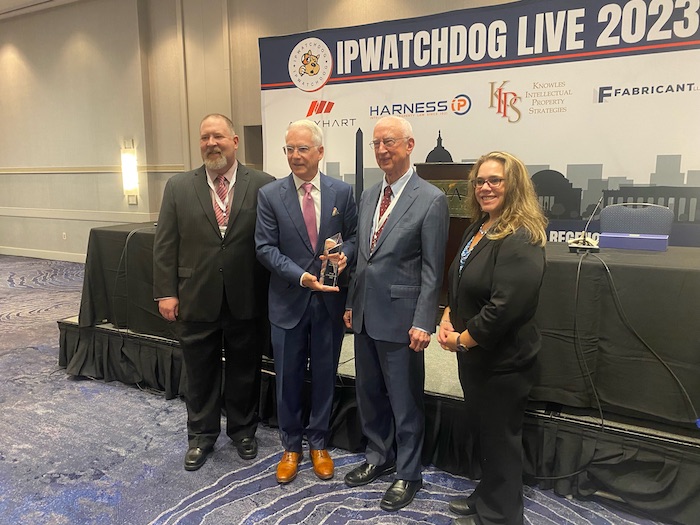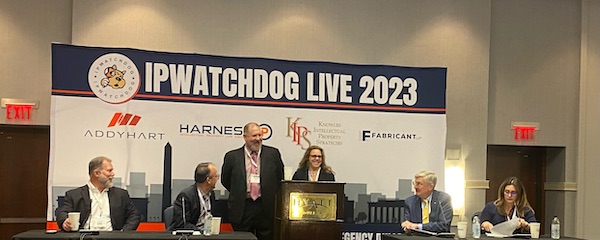“Michel, who is supporting the Patent Eligibility Restoration Act (PERA), said he sympathizes with inventors’ fears that PERA may still allow judges to confuse the law [but explained] ‘I think it’s not true, because the legislation is carefully enough crafted.’”

From Left: Gene Quinn, Brian O’Shaugnessy, Judge Paul Michel and Renee Quinn
The third annual IPWatchdog LIVE conference opened with panels examining global trends in IP policy and a review of U.S. Supreme Court case law, as well as the presentation of the third annual Paul Michel Award, which each year honors a respected industry leader and advocate for fairness in the IP community.
On a panel that detailed some of the most recent U.S. Supreme Court’s IP decisions, retired U.S. Court of Appeals for the Federal Circuit (CAFC) Chief Judge Paul Michel described the arguably contradictory holdings in Google v. Oracle and Warhol v. Goldsmith as “useless” in terms of substantive guidance from the Court. “These two cases represent a failure on the part of the Supreme Court to provide meaningful guidance to users who need it now,” Michel said. Professor Llew Gibbons of the University of Toledo College of Law explained the holdings in each of the cases and concluded that “I couldn’t find a principled reason other than ‘we want to come out differently’” for the Court’s ruling in Warhol, considering the Google decision.
Michel said that the “architecture of the system and functionality in the marketplace” are what ultimately matter, and, turning to the Supreme Court’s ruling in another IP case, Amgen, Inc. v. Sanofi, said the reasoning was “sufficiently vague that the marketplace is once again left bereft of guidance.” The High Court’s failure is due in part to a lack of understanding of market realities and an inability to grasp the basic subject matter, said Michel, and it’s indicative of “a systemic problem in this country—not just at the Supreme Court level.”
Judge Michel has been vocal about the need for reform at the CAFC as well, and renewed past calls for that court to go en banc more often and refrain from serially issuing Rule 36 judgments, for example. And at the Supreme Court, he said the Justices need to get better at choosing the right cases and then focusing on the right questions when they do grant cases. He said he is hopeful the Court might take up the latest Section 101 patent eligibility petition pending in CareDX v. Natera, for which Michel submitted an amicus brief with Professor John Duffy, because, unlike the American Axle case, where the Court denied certiorari last year, the patent at issue stands to benefit human health.
Delving further into the topic of patent eligibility, Michel, who is supporting the Patent Eligibility Restoration Act (PERA), also addressed opposition to that bill from the independent inventor community. While he said he fully sympathizes with the inventors’ fears that PERA may still allow judges to confuse the law because “they got badly shafted by the Court, and it’s entirely understandable, I think it’s not true, because the legislation is carefully enough crafted.”
Paul Michel Award
Michel and IPWatchdog also tonight presented the third annual Paul Michel Award, which went to Brian O’Shaughnessy, Chair of Dinsmore & Shohl’s IP Transactions and Licensing Group and a past president of the Licensing Executives Society (USA and Canada), Inc., for his many contributions to IP law and advocacy efforts. Past awards have gone to U.S. District Court for the Western District of Texas Judge Alan Albright (2021) and former U.S. Patent and Trademark Office (USPTO) Director Andrei Iancu (2022).
Presenting the award to O’Shaugnessy, Michel said his hard work advocating in Congress and via amicus briefs and White Papers over the last 12 years are particularly crucial because the race to counter opposition to a robust IP system is a marathon, requiring consistency and dedication.
O’Shaughnessy said advocates like Michel, IPWatchdog Founder and CEO Gene Quinn, and IPWatchdog’s Chief Operations Officer, Renee Quinn, are “the real heroes of the IP system,” which is currently “under attack,” and he urged those attending to join in the fight to ensure the U.S. doesn’t cede its long held innovation advantage to competitors as a result of muddled or misguided law and policy.
Global IP Prognosis

From Left: Patrick Kilbride, Arthur Daemmrich, Gene Quinn, Renee Quinn, Alden Abbott and Noel Egnatios
During opening panels titled “The State of the Global IP System: The United States vs. the World” and “Global Perspectives on Monetization: The State of the Industry,” speakers on both panels predicted that the Unified Patent Court (UPC) will soon change the game for patent owners, as it has so far lived up to the positive predictions. Matteo Sabattini, a consultant with Convida, speaking on the monetization panel, said the landscape for patent monetization is in part driven by where injunctions are available, and that early indications for the UPC confirm that it will be fast, cost effective and that the court will readily grant injunctions. Noel Egnatios, Chief Legal Officer at DivX, said during the global IP system panel that the UPC, as well as efforts by China and other countries to make themselves attractive forums for litigating patent cases, will likely cause global IP strategies to shift in the near future.
IPWatchdog LIVE is being held Sunday through Tuesday at the Hyatt Regency Dulles in Herndon, Virginia, and will feature speakers including USPTO Director Kathi Vidal, CAFC Judge Pauline Newman, Senior Vice President and Deputy General Counsel at Bristol Myers-Squibb, Henry Hadad, and many more. IPWatchdog would like to thank the program’s many generous sponsors and exhibitors, including major sponsors Knowles Intellectual Property Strategies; AddyHart; HarnessIP, Fabricant, LLP; IP.Com; and LexisNexis.

![[IPWatchdog Logo]](https://ipwatchdog.com/wp-content/themes/IPWatchdog%20-%202023/assets/images/temp/logo-small@2x.png)

![[Advertisement]](https://ipwatchdog.com/wp-content/uploads/2024/04/UnitedLex-May-2-2024-sidebar-700x500-1.jpg)
![[Advertisement]](https://ipwatchdog.com/wp-content/uploads/2024/04/Artificial-Intelligence-2024-REPLAY-sidebar-700x500-corrected.jpg)
![[Advertisement]](https://ipwatchdog.com/wp-content/uploads/2024/04/Patent-Litigation-Masters-2024-sidebar-700x500-1.jpg)

![[Advertisement]](https://ipwatchdog.com/wp-content/uploads/2021/12/WEBINAR-336-x-280-px.png)
![[Advertisement]](https://ipwatchdog.com/wp-content/uploads/2021/12/2021-Patent-Practice-on-Demand-recorded-Feb-2021-336-x-280.jpg)
![[Advertisement]](https://ipwatchdog.com/wp-content/uploads/2021/12/Ad-4-The-Invent-Patent-System™.png)






Join the Discussion
No comments yet.